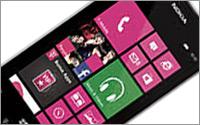 Go ahead and debate Microsoft's acquisition of Nokia's handset division for about $7 billion and whether it can build a strong advertising network -- but marketers shouldn't fail to take
into consideration the patents that go along with the company's global handset engineering, manufacturing, sales and distribution business.
Go ahead and debate Microsoft's acquisition of Nokia's handset division for about $7 billion and whether it can build a strong advertising network -- but marketers shouldn't fail to take
into consideration the patents that go along with the company's global handset engineering, manufacturing, sales and distribution business.
The ongoing mobile patent war between Microsoft and
Google took a turn with the latest acquisition.
Ericsson, Nokia, Qualcomm and Alcatel-Lucent collectively control the majority of patents in the 2G and 3G wireless space supporting mobile
handsets, many of which have been the "crux" of ongoing patent wars. Nokia, LG and Qualcomm alone own more than 43% of all seminal -- or strong -- patents, according to iRunway.
Those patents
related to data transfer rates will become the most advantageous. Nokia owns 213 communication patents; 272 related to data transfer rates; 163, positioning; 196, power management; 381, security; and
138, services.
Speculation now puts BlackBerry in Microsoft's pocket for its network infrastructure. Bloomberg reports that sources familiar with Microsoft may still have an interest
in acquiring BlackBerry, pointing to its ties with the enterprise market as fodder.
advertisement
advertisement
As for Nokia, the company accelerated its IP investments between 1997 and 2005, according to iRunway. IThe
company tops the list among 2G and 3G patent owners by owning 26% of all standard essential patents. It has 55% more standard essential patents than Qualcomm, which comes in at No. 2. The analysis was
done to understand the quality of the portfolio.
The iRunway report explores 2G and 3G patent
holders and details on numbers and categories of patents. The report also reveals that certain small companies that hold key 2G and 3G patents have remarkably high patent monetization potential.
In the recent deal announced Sept. 3, Microsoft said it would acquire about 8,500 design patents from Nokia, the physical features distinguishing each mobile device. The Redmond, Wash. company
would license for $2.7 billion another set of 30,000 utility patents that Nokia will continue to own. This group encompasses Nokia's patents aside from those owned by the Nokia Siemens Network (NSN),
which Microsoft will use for a variety of products and devices.
Florian Mueller, an intellectual property activist turned analyst, points to a slide found on Microsoft's investors page. He tells us in a blog post how Microsoft explains: "Nokia is also
conveying rights under its agreements with IBM, Motorola Mobility, and Motorola Solutions. It means that a Motorola-Nokia license deal struck a few years ago apparently goes with Nokia's wireless
devices business. As a result, Google's Motorola can't sue Microsoft's future smartphone business for the remaining term of that agreement, and Motorola's patent portfolio gets less valuable by the
day."